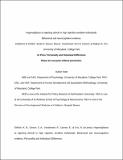Hypervigilance to rejecting stimuli in high rejection sensitive individuals : behavioral and neurocognitive evidence
Abstract
Individuals who are high in rejection sensitivity are vigilant toward social cues that signal rejection, and they exhibit attention biases towards information that confirms expectations of rejection. Little is known, however, about the neural correlates of rejection sensitivity. The present study examined whether rejection sensitivity is associated with individuals’ neural responses to rejection-relevant information. Female participants, classified as high or average in rejection sensitivity, completed a modified dot-probe task in which a neutral face was paired with either another neutral face or a gaze-averted (“rejecting”) face while EEG was collected and ERP components were computed. Behavioral results indicated that average rejection sensitive participants showed an attention bias away from rejecting faces, while high rejection sensitive participants were equally vigilant to neutral and rejecting faces. High rejection sensitivity was associated with ERP components signaling elevated attention and arousal to faces. These findings suggest that rejection sensitivity shapes behavioral and neurocognitive responses to faces.
Citation
Ehrlich , K , Gerson , S , Vanderwert , R , Cannon , E & Fox , N 2015 , ' Hypervigilance to rejecting stimuli in high rejection sensitive individuals : behavioral and neurocognitive evidence ' , Personality and Individual Differences , vol. 85 , pp. 7-12 . https://doi.org/10.1016/j.paid.2015.04.023
Publication
Personality and Individual Differences
Status
Peer reviewed
ISSN
0191-8869Type
Journal article
Description
This research was supported by a grant from the National Institute of Child Health and Human Development (HD17899) and a NARSAD Distinguished Investigator Award to Nathan A. Fox and by DA027365 and HD076563 to Katherine B. Ehrlich. Date of acceptance: 10/04/2015Collections
Items in the St Andrews Research Repository are protected by copyright, with all rights reserved, unless otherwise indicated.

